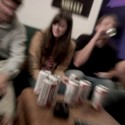Alcholic dementia often overlooked
Alcoholic dementia is often an overlooked type of memory dysfunction. It is estimated that about 8 percent of people in the U.S. over age 65 may have an alcohol abuse problem. Sixty percent of the elderly drink and 5 to 10 percent are binge drinkers. It may be hard to believe, but Medicare, which is the major insurance for patients over 65, spends more on alcohol-related problems than on treatment for heart attacks. Unfortunately, doctors fail to recognize this type of dementia more than 60 percent of the time. Families and spouses also do not seek medical attention as frequently as with other forms of dementia.
Before going over the signs and symptoms of alcoholic dementia, let’s remind everyone what the acceptable amount of alcohol is for a person over 65. It is actually different for men and women. Women can safely have a four-ounce glass of wine, bottle of beer or one two-ounce drink of hard liquor daily. Men can have double that. Anything more is considered excessive. It is believed that the aging liver cannot process alcohol as effectively as the liver of a younger person.
To diagnose dementia, one has to have memory loss and it has to be severe enough to affect daily functioning for the given person. It may be tricky to diagnose dementia if someone has had a long history of problems functioning and thinking due to alcohol intoxication. Alcohol abuse is also associated with nutritional problems — especially lack of vitamin B1, also known as thiamine.
Symptoms of low thiamine are called Wernicke’s encelopathy, and include difficulty with balance, eye movement paralysis and confusion. Sometimes the symptoms may resolve with replacement of the vitamin B1 and cessation of drinking.
Another unique manifestation of alcoholism and lack of vitamin B1 is called Korsakoff’s psychosis. The most characteristic feature of this malady is confabulation, or filling memory gaps with made-up, sometimes outrageous stories.
When comparing alcoholic dementia to Alzheimer’s disease, it has to be said that distinguishing the two is not always easy. Alcohol-related dementia, just like Alzheimer’s, makes a patient repetitive, forgetful and unable to take care of daily chores. Both diseases get worse over time, and both Alzheimer’s and alcoholic dementia patients are often NOT aware of their memory loss.
The most striking difference between the two forms of dementia is that alcoholic dementia affects mostly the front and the back of the brain (called the frontal lobe and the cerebellum) and Alzheimer’s affects more the side part (temporal lobe). The frontal lobe is very important because this is where the social grace, executive functioning, inhibition and judgment centers are located.
The back of the brain, or cerebellum, is responsible for balance and walking. What it means is that patients with alcoholic dementia tend to have problems with daily life, tend to be impulsive and angry, have outbursts of difficult behavior and may be dangerous at times. They also may have problems walking. (Remember, they also may have the vitamin B1 problem!!!)
Alcoholic dementia cannot be diagnosed when a patient is acutely intoxicated or withdrawing from alcohol. This is because almost always patients in these situations will have an acute confusional state called delirium. Only after the acute confusion clears can one start evaluating dementia.
Another very interesting phenomenon is that patients with alcoholic dementia often score very well on standardized memory tests. Remember, these tests mostly check the temporal lobe, or the side of the brain, and not the front or the back. (If someone has an ulcer on their foot and you only see his hands, he may get a clean bill of health despite being sick, so checking the right part is very important.) There are sophisticated tests specifically for evaluating the frontal lobe and they are very helpful in diagnosing alcoholic dementia.
When it comes to treatment, abstinence is the only way to go. This is not often possible without family taking over control of the affected person’s life, and that is a very painful process. Trying to help families dealing with a loved one who has alcoholic dementia is one of the most challenging things we geriatricians do. Medications for memory stabilization often prescribed in patients with Alzheimer’s dementia have not been tested in alcoholic dementia, so when given they are given “off label,” meaning that the results may not be as encouraging.
Sometimes medications for depression and treatment of anger may actually be more effective. The involvement of a specialist is essential here. At times I see in my practice dramatic improvement with the person’s abilities and memory after alcohol is out of the picture, but I would not call it the rule.
source: Connecticut Post
